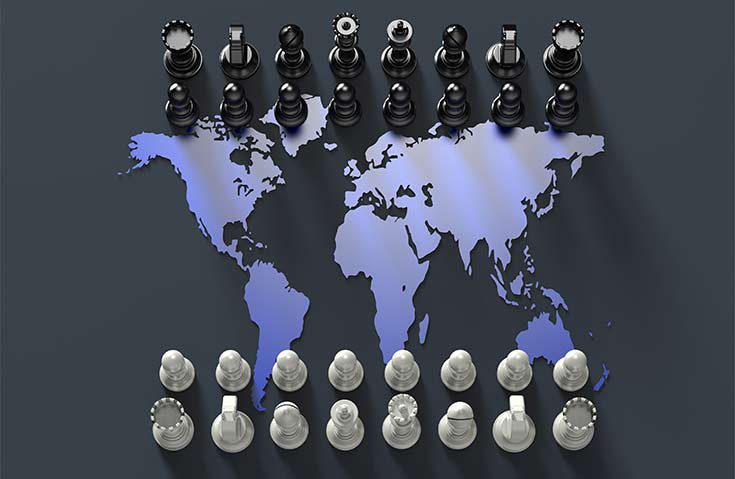A time of growing global tensions
Prince Michael of Liechtenstein draws comparisons between current global politics which, he says, are similar to those of 1910-1914 that led to World War I, and economic scenarios – similar to those of the 1930s – which led to the political circumstances that caused World War II.

(Image: Posteriori/Shutterstock)
China recently deployed advanced surface-to-air missiles on the Paracel Islands, an archipelago in the South China Sea. Chinese air force facilities on the Spratly Islands, another archipelago about 300 km south of the Paracels, may be operational within a few months. All this underlines China’s growing naval power in the region.
Although China claims its activities are purely defensive and peaceful, tensions will further increase with ASEAN countries, especially Vietnam and the Philippines, and the United States. It is likely that China will use the US naval presence in the Pacific to argue the necessity of these ‘defensive’ measures.
China is also increasing its naval presence in the Indian Ocean, an understandable move in order to guarantee its supply of raw materials. Though this issue garners less media attention than the activity in the South China Sea, it raises serious concerns for the US and especially for India.
Tensions, however, are not only growing in the Pacific and Indian Oceans. Many other regions are heating up.
The still unresolved disputes that pit Russia against the EU and US – mainly over Ukraine but also the Balkans and Georgia – resulting in ‘hybrid war’ between the two sides.
With the West and Russia issuing tit-for-tat sanctions, an economic ‘war’ is underway. The one-sided reporting coming out of media such as Russia Today, and even some Western outlets, show a war of propaganda is also being waged. Meanwhile, it has become common to see militaries flexing their muscles.
Moscow’s intervention in Syria has given the conflict another dimension. Russian forces are operating in an area very sensitive to Turkey, NATO’s number-two military power. Conflict between Russia and Turkey has, so far, remained verbal and economic, but is intense nonetheless. This serves as another point of potential confrontation between the West and Russia.
Adding to these worries are grave economic crises that have reduced trust between peoples and their governments. The huge difficulties facing China and Russia have, justifiably, generated a lot of discussion. But we should not forget that Europe and the US have proven unable to resolve their public deficit and sovereign debt problems. As it is now, Europe and the US will not find a solution to these issues without asking their populations for huge sacrifices, similar to those in a wartime economy.
As the economic picture worsens, governments not only in China and Russia, but also in the West, may become more outwardly aggressive in an attempt to divert attention from domestic problems.
Historically, it’s easy to see the resemblance not only to the politics of 1910-1914, which led to World War I, but also to the economic scenario of the 1930s, which led to the political circumstances that caused World War II.
Another similarity can be found in leadership. It appears that both China and Russia have clear, interest-driven strategies. Western leaders however, are so focused on their domestic problems, so convinced of their ‘value superiority’ and are also, unfortunately, so reactive rather than proactive, that they are not paying enough heed to long-term Chinese and Russian interests. This lack of vision does not allow for dialogue on a level playing field, and casts doubt on Western leaders’ strategic planning.
We are only left to wonder if the world is again approaching a major human disaster.
This blog was first published on World Review, which publishes reliable and unbiased analysis and insights from experts on world affairs.
HSH Prince Michael of Liechtenstein studied commerce at the Vienna University of Economics and Business, and consolidated his studies by assignments for the banking and industrial sectors in Belgium, Canada and the USA. From 1978 to 1987 he worked for Nestlé SA in the fields of controlling, management and marketing on various markets in Europe and Africa.
In 1987 he took over the management of Industrie- und Finanzkontor in Vaduz (Liechtenstein), an international advisory and fiduciary trust company, where he now holds the position of president.
He is founder and chairman of Geopolitical Information Service AG, as well as president of the think tank ECAEF (European Centre of Austrian Economics Foundation), based in Vaduz.
Prince Michael of Liechtenstein, 29/02/2016